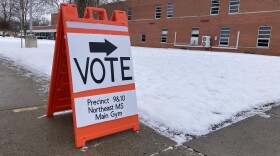Most of us don’t spend our free time thinking about zoning.
But in Harbor Springs, a lake resort town on Little Traverse Bay, residents are now voting on whether to repeal their city’s new zoning codes, after a petition from residents placed it on November ballots.
Bill Mulder lives just a couple blocks away from Harbor Springs’ Main Street, which is lined with cafes, a fudge shop, and souvenir stores. The downtown strip is tucked between Lake Michigan and a tall bluff that overlooks the bay.
Mulder is a longtime resident and he thinks a lot about housing. He helped start a community land trust in this area. He’s also the chair of the city’s planning commission, and he spent almost two years on the city’s zoning committee.
He has seen Harbor Springs face the same challenge as many resort towns.
“It's really hard for a year-round person to compete with a cash buyer from out of the area who comes in to buy a vacation home or even a year round home,” he said.
Mulder, along with the rest of the city’s zoning committee and various city officials, came up with a new zoning code that passed the city council in May of this year.
They hoped to ease the pressure in the city’s residential neighborhoods, even if just slightly, by allowing accessory dwelling units (also known as carriage houses or granny flats) and duplexes throughout most of the town.
Mulder said he thought the changes were fairly modest, and he says they intended to preserve the town’s character.
He said many found the old zoning code unwieldy. The small city of about 1,200 residents was broken up into 17 different districts.
Compare the two codes
“It looks like it was typed on a typewriter,” Mulder explained. “The columns don't line up, the illustrations are primitive. And our residents and everybody found it hard to use.”
But some were not pleased when they got wind of the changes, including J.R. Elliot.
“I spent some time with what I was hearing, and became increasingly disturbed about what I was finding out,” she said. "The whole setup was for density and development, and that's not why I live here.”
Elliot took issue with the idea of more housing units, and the change in lot sizes — the city narrowed the minimum width. The way she puts it, people would be living on top of each other.
She’s part of a group called “We Love Harbor Springs,” which is behind an effort to repeal the zoning changes. They filed multiple petitions this year, including the one that put the question on Harbor Springs ballots.
She said she understands housing is expensive in Harbor Springs. But, she doesn’t think adding more units within town limits is the answer.
When asked about the need for housing in the area, she said, “the goal, it sounds like, is to provide more opportunities for people of different incomes.
"In the past, there have been ways that work with that," she said. "Growing up, I may work in a community outside of where I live for a reason. I go work there for a reason. But my expectation is not necessarily for that community to provide me a house.“
She said she’d support, even financially support, housing in the townships just outside the town. But not duplexes in town that could add density.
The city says duplexes and carriage houses wouldn't bring the population up to its past peak of full-time residents. According to census data, there’s around 300 fewer full-time residents within the town limits now than 20 years ago.
The zoning committee and the city council held various kinds of public forums as they were considering all this.
Victor Sinadinoski, Harbor Springs’ city manager, estimated that there were around 30 meetings where members of the public weighed in.
They made zoning changes, he says, after they updated their master plan in 2022 — something the state asks all cities to do regularly.
About half the town is over the age of 60. Their school enrollment has fallen lately. The city says it needs young families for the community to run year-round, but without more flexible housing options, it’s hard to draw them in.

He’s urging people to read the new codes for themselves, and ask the city questions about them.
“It's a significant decision that the residents have at the ballot to repeal a zoning code. I'm not sure of many communities who have put a whole zoning code on their ballot to be repealed. I haven't found any in my research," he said. "It's not something that's been done a lot. So I think people should really think thoroughly through what the code says and what the potential consequences could be.”
This fall, a new group formed, called “We Love Harbor Springs, Too,” that’s been advocating for Harbor Springs residents to keep the town’s new zoning as it is.
Competing “yes” and “no” lawn signs — both handmade and distributed by the two groups — are impossible to miss on most of the town’s streets.
If the zoning code was repealed, Sinadinowski says the city would start back at square one.
And after two years of debating how the zoning code could help the city’s goals — like providing homes at a range of prices, supporting the city’s character, and its nature — a new city council would have to start from scratch.









